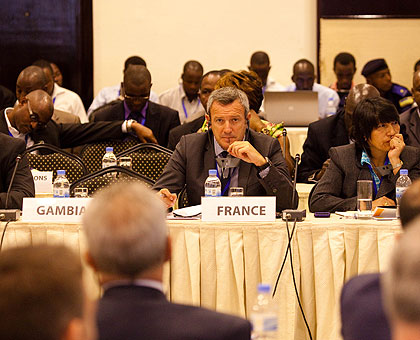The international police (Interpol) has admitted to facing some challenges in arresting Genocide fugitives, mostly related to the time when the crimes were committed.


The international police (Interpol) has admitted to facing some challenges in arresting Genocide fugitives, mostly related to the time when the crimes were committed.
Although Interpol has issued more than 200 red notices at the request of the Rwandan government over the years, so far only 40 of them have been honoured, which has been termed as a "small percentage.”
Stephano Carvelli, the head of fugitive investigative support at Interpol, said arresting fugitives who committed crimes a long time ago can be challenging because the period allows fugitives ample time to find shelter, fake documents or change their identities.
Stephano Carvelli, the head of fugitive investigative support at Interpol, said arresting fugitives who committed crimes a long time ago can be challenging because the period allows fugitives ample time to find shelter, fake documents or change their identities.
Carvelli was yesterday speaking on the sidelines of the closing of the just concluded international conference convened by Interpol and the Rwanda National Police on genocide, war crimes and crimes against humanity under the theme, "Closing the impunity gap.”
He also cited the issuance of a red notice several years after atrocities as a challenge that could hold back the organisation’s efficiency.
"A long period has elapsed between committing a crime and the issuance of a red notice; if a red notice is issued after 15 years or so, there would be a big challenge. Investigation of a crime committed 20 years ago is difficult to collect evidence because it could have been destroyed and maybe hard also to collect evidence about the possible location of a fugitive,” Carvelli said.
However, like Interpol sectary-general Kenneth Noble, he pledged that they would not rest until all the Genocide fugitives have been brought to book.
Carvelli said the 40 arrests was a major milestone going by Interpol’s perspective as it is much more difficult tracking criminals of yesteryears compared to modern-day fugitives.
"It is an important success because tracking down a fugitive who committed a crime recently is easier because technology such as mobile devices is helpful for law enforcement officers to track them down. A fugitive who disappeared 20 years ago when technological advancement was still low can be challenging,” Carvelli said.
He added that it was the responsibility of Interpol to facilitate the collection and the finding of information even when it concerns a person who disappeared 20 years ago and that they were up to task.
Different actors in extradition
The Interpol detective said the key to achieve this is to increase and promote cooperation among law enforcement agencies to have the best sharing of information on the fugitives.
Regarding the delay taken to process the extradition of criminals, he said besides Police activity and international police cooperation, there are other authorities involved such as the ministries of justice and that extradition is a long process because there are different actors involved.
Among the notorious Rwandan fugitives include Genocide chief financier Félicien Kabuga, the then head of the notorious presidential guard Protais Mpiranya, and Gen. Augustin Bizimana, who was the minister for defence.
Carvelli said cooperation is increasing and that they were raising the strength of the police network, facilitating contacts and the connection between experts through such meetings.
Once information regarding a suspect is circulated to member countries, there are specific units that act as contact points to immediately cooperate with the authorities in charge.
Speaking during the closing ceremony, the Minister for Security, Sheikh Musa Fazil Harelimana, called on countries to show concerted efforts by, among others, enacting legislation to try Genocide suspects.
"I pay tribute to countries that have demonstrated their will to enact legislation giving them universal jurisdiction to try Genocide fugitives. We encourage other countries that have not yet done so to do so,”Sheikh Harelimana said.
The meeting noted that locating and arresting the fugitives suspected of masterminding the 1994 Genocide against the Tutsi requires concerted efforts among member countries of Interpol.
The sixth Interpol experts meeting brought together senior police officers and security officials from member countries of the organisation and sought ways to bring to justice the fugitives of war crimes and crimes against humanity.
It was also the first time the meeting took place in a country that has previously experienced atrocities.


